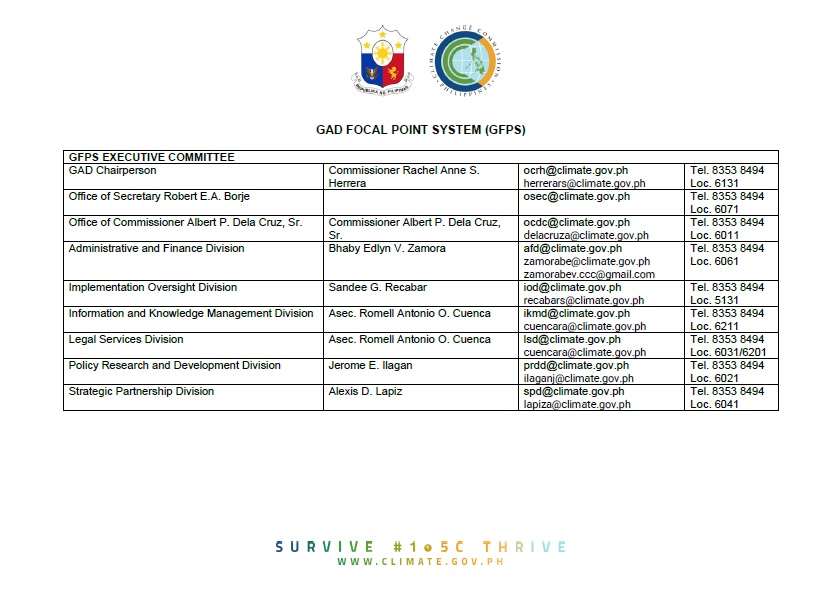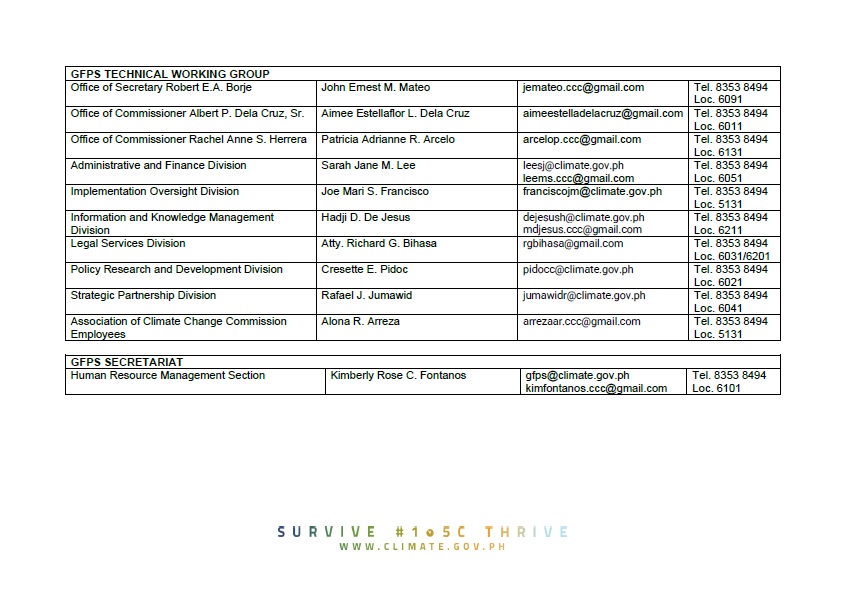-
RESOURCES
-
-
-
-
Gender and Climate Change
Overview
The Climate Change Act of 2009 declared that it is a policy of the State to incorporate a gender-sensitive, pro-children and pro-poor approach in designing and implementing all climate change and renewable energy efforts, plans, and programs. In 2012, the Climate Change Act was amended create a domestic climate change adaptation fund, called the People’s Survival Fund (PSF), which is aimed at supporting projects that are responsive to gender-differentiated vulnerabilities, climate-risk profiles and other considerations.
These provisions were mainstreamed in the policies and programs of the Climate Change Commission, thus achieving the following results:
(1) Ensured the active involvement of women in decision-making (through its multi-stakeholder consultations, capacity-building initiatives, and participation in international climate negotiations);
(2) Promoted the integration of gender concerns and perspectives in policies and programmes (through the development and updating of plans); and
(3) Required the assessment of the impact of climate-resilient development policies and interventions on women (through monitoring and evaluation reports and gender analysis of projects for funding under the People’s Survival Fund and other climate finance facilities).
In 2019, the CCC adopted the Commission Resolution No. 2019-02, thereby strengthening the framework for gender-based approaches in the formulation and implementation of climate change policies, plans, programs, and activities in the country, including the generation of sex-disaggregated data and the conduct of gender analysis. Moreover, the Resolution established the need for coordination amongst key agencies in promulgating policies, directives, and initiatives supportive of the collaborative approach to accomplish its objectives.
Moving forward, the Commission is currently undertaking an NDC gender analysis which will identify entry points in ensuring that gender-responsive initiatives are incorporated in the Philippines’ first NDC, with support from the UNDP’s Nationally Determined Contributions (NDC) Support Programme.
Lastly, the CCC itself has observes gender-balance and women representation within the organization. Under its Revised Implementing Rules and Regulations, the Commission shall be composed of four Commissioners, including the President as ex-officio Chairperson. At least one of the Commissioners shall be a woman. Also, the Commission established a GAD Focal Point System to monitor its GAD mainstreaming efforts in climate actions, and has appointed gender focal points to international fora i.e. UNFCCC and IPCC.
-
RESOURCES
-
-
-
-
Plans on Gender and Climate Change
International Plans on Gender and Climate Change
1. Beijing Declaration and Platform for Action
The Beijing Declaration and Platform for Action or BPfA is a landmark document for advancing the rights of women and gender equality worldwide agreed during the 4th World Conference on Women in 1995. The international community came to a consensus and agreed to a comprehensive blueprint of commitments supporting the full development of women and their equality with men in 12 areas of concern: (1) women and poverty; (2) education and training of women; (3) women and health; (4) violence against women; (5) women and armed conflict; (6) women and the economy; (7) women in power and decision-making; (8) institutional mechanisms; (9) human rights of women; (10) women and media; (11) women and the environment; and (12) the girl child.
Source: PCW website
The enhanced gender action plan sets out objectives and activities to advance knowledge and understanding of gender-responsive climate action and its coherent mainstreaming in the implementation of the UNFCCC and the work of Parties (Member States), the secretariat, UN entities, and all stakeholders, as well as women’s full, equal, and meaningful participation in the UNFCCC process.
Source: UNFCCC website
National Plans on Gender and Climate Change
1. National Framework Strategy on Climate Change
The Framework serves as the basis of the Philippine government’s climate change planning, research and development, extension, and monitoring of activities, programs and projects, and climate financing, with the aim of protecting vulnerable communities from the adverse impacts of climate change.
Mandated by the Revised Implementing Rules and Regulations of the amended Climate Change Act, the Framework shall include Gender Mainstreaming as one of its major components.
2. National Climate Change Action Plan
The National Climate Change Action Plan 2011-2028 operationalizes the NFSCC. Gender Mainstreaming is among its cross-cutting strategies to achieve the Plan’s ultimate goal of building the adaptive capacities of women and men in their communities, increasing the resilience of vulnerable sectors and natural ecosystems to climate change, and optimizing mitigation opportunities towards gender-responsive and rights-based sustainable development.
3. Gender Equality and Women Empowerment Plan
The GEWE is the National Plan to achieve the goals of the Magna Carta of Women and other international gender-related obligations. It provides a blueprint for government in implementing strategies and actions on gender equality and women empowerment, contributing to the attainment of inclusive national development.
Under the said plan, climate change is incorporated into Chapter 9: Disaster Risk Reduction Management, which tackles the impact of natural hazards on women and girl-children.
4. Guidelines on the GAD Agenda
The GAD Agenda is a government agency’s strategic framework and plan for gender mainstreaming, and achieving women empowerment and gender equality. It shall (1) serve as basis in identifying programs, activities, and projects to be undertaken to achieve the GAD goals and outcomes; (2) provide the monitoring and evaluation (M&E) framework for assessing GAD results and outcomes that shall be the basis for strengthening the mainstreaming of a GAD perspective in the agency’s operations and programs; and (3) be formulated in a participatory, consultative and inclusive process. It shall consider the results from consultations with women target beneficiaries as well women’s groups/organizations working on the sector and other concerned stakeholders, and the identified gaps resulting from gender analysis.
Source: PCW
5. Guidelines on Gender Planning and Budgeting and Accomplishment Reporting
This PCW issuance guides government institutions in reporting their gender mainstreaming programs / activities / projects (PAPs).
The Climate Change Commission observes the GAD Planning, Budgeting and Accomplishment Reporting Guidelines in reporting its gender mainstreaming PAPs in accordance with its mandates under the Magna Carta of Women and the Climate Change Act, as amended.
-
RESOURCES
-
-
-
-
Reports
1. M&E Report on National Climate Change Action Plan 2011-2016
The first NCCAP M&E (2011-2016) looked into the readiness or preparedness of the Philippine Government in mainstreaming climate change into its decision-making processes—including policies, institutional arrangements, knowledge and information systems, and flagship programs.
This report includes a review of the government’s gender mainstreaming readiness in implementing climate change actions.
In 2019, the Philippines submitted the BPfA+25 Progress Report which includes an assessment of current challenges that affect the implementation of the agreements enshrined in the BPfA.
It also highlighted major achievements on gender equality and empowerment of women and its contribution towards the full realization of the 2030 Agenda for Sustainable Development through a gender perspective.
The Report includes a chapter (Chapter 6) on environmental conservation and climate action that features the milestones and challenges of the Philippines in implementing gender equality and women empowerment strategies related to environment and climate action.
BPfA+25 refers to the review and evaluation of countries' implementation and progress on achieving the BPfA goals, 25 years after its adoption.
3. Gender Country Profile 2021 for the Philippines
The EU Delegation to the Philippines engaged the University of the Philippines Center for Women’s and Gender Studies to update the country’s Gender for 2021. The gender country profile puts emphasis on the areas of engagement of the EU Action Plan on Gender Equality and Women’s Empowerment in External Action 2021-2025 (GAP III). Based on wide consultations, it covered a review of the legislative and policy framework in the Philippines, including regional and international commitments, and an overview of the socio-economic, cultural, political, and demographic context. The gender country profile and highlighted how the COVID-19 pandemic has further heightened already existing inequalities.
Source: EU Delegation to the Philippines
-
RESOURCES
-
-
-
-
GAD Focal Point System
GFPS DIRECTORY 2022Pursuant to the Magna Carta of Women (MCW), all government instrumentalities are mandated to create a GAD Focal Point System (GFPS) mechanism to catalyze and accelerate gender mainstreaming within their organization. In compliance, the Climate Change Commission, thru Office Order. 2020-063, established it GFPS to lead the implementation of MCW and other pertinent issuances on gender
CCC GFPS Directory
-
RESOURCES
-
-
-
-
CCC GAD Documents
1. GAD Plan and Budget
Pursuant to the PCW-NEDA-DBM Joint Circular No. 2012-01, the Commission’s GAD planning and budgeting is conducted annually as part of the overall programming and budgeting exercises of the CCC. The Programs, Activities and Projects (PAPs) in the GPB are included in the Commission’s budget proposal and are reflected in the Annual Work and Financial Plan (WFP) of concerned offices, divisions and units within the CCC.
2. GAD Accomplishment Report
Pursuant to the PCW-NEDA-DBM Joint Circular No. 2012-01 and latest General Appropriations Act, the Commission annually submits its GAD Accomplishment Report and expenditures to the Philippine Commission Women, Department of Budget and Management and Commission on Audit. The GAD Accomplishment Report reflects the milestones of CCC in mainstreaming gender in climate actions.
3. GMEF Reports
Pursuant to the PCW Memorandum Circular No. 2016-03, the Commission conducts an annual GAD Audit using the Gender Mainstreaming Evaluation Framework (GMEF). The GMEF is a prescribed PCW tool used by the government agencies to measure the level of mainstreaming. Below are the GMEF reports developed by the CCC and were validated by the PCW:

